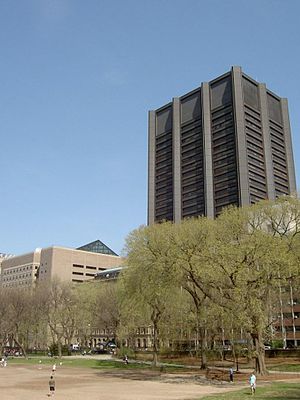Kidney Quest: Initial Screening for Donors
 |
| Mount Sinai School of Medicine, New York, NY (Photo credit: Wikipedia) |
On a hot, humid Tuesday morning, five of us piled into my sister’s Suburban and headed to Mount Sinai for our initial screening. Without a long wait in the outer office, Susan Siriwatana, our case manager, ushered us into her office. Every transplant has a nurse who oversees and coordinates the entire process. Here we learned two things that made us gasp. She said:
- “We will find a donor because you are siblings.” Since four of us were available to donate (my youngest sister was pregnant with her last child, so she was off the hook), Alan was virtually guaranteed a match. As stated in the last post, siblings offer the best chances for a match.
- ” Blood type is the first eliminator.” Alan was A positive. Anyone not A positive or the universal donor would be eliminated.
- “After a donor is chosen, the surgery can be performed within three weeks.” Three weeks! We gasped collectively. We agreed to matching with the probability of donating within five years. Little did we know, how soon the surgery could be completed.
After our collective interview, we were called in one by one and interrogated. And the questions for our initial organ donation screening?
- Have you ever done drugs?
- Do you smoke?
- Do you drink?
- Have you had cancer?
- Do you have safe sex?
- Ever have hepatitis? HIV? TB?
If you are wiping your forehead and breathing a sigh of relief because your youthful drug habits or smoking have eliminated you–you’re not off the hook. Much depends on when it occurred, how frequently and your current health. I failed some of the above, passed others (not revealing which). I still became the donor.
Once the initial screening was over, the phlebotomist drew five vials of blood for testing. It turned out she needed more than five–but that’s another day’s blog.
Are you considering donating a kidney? Do you have questions or comments? Feel free to add them in the comment box.


No Comments